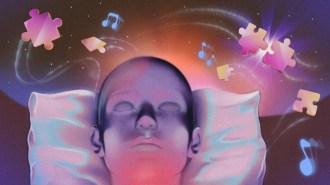PARK CITY, Utah — Mothers with teenagers or young adults living at home face plenty of stress. If the young home-dwellers have been diagnosed with autism, the emotional intensity of caregiving surges dramatically in the mothers and may undermine the functioning of a critical stress hormone, a long-term study suggests.
Over a five-year span, women who had children with autism living at home reported many more challenges in their daily lives than women caring for typically developing teens and young adults, reported psychologist Marsha Seltzer of the University of Wisconsin–Madison on June 4 at the annual meeting of the Jean Piaget Society. Moms of children with autism spent nearly all of their time on caregiving activities, experienced an inordinate amount of daily fatigue, often got into arguments at home and at work, and reported having negative feelings far more often than positive ones.
Analyses of saliva samples collected from women near the end of the study period showed that those caring for offspring with autism produced unusually low levels of the stress hormone cortisol throughout the day. In mothers caring for teenage or young adult children free of developmental problems, cortisol levels rose sharply throughout the morning and then declined to a level that still remained well above that of mothers tending to kids with autism.
“We’re seeing remarkably low levels of cortisol activation in mothers caring for their children with autism, which may reflect the toll taken by chronic stress and fatigue in their lives,” Seltzer said.
Cortisol is known to increase in response to stress, and is believed to be a response that helps people deal with threats.
More than the language and social difficulties associated with autism, long-standing behavior problems of some diagnosed youngsters — including disobedience and physical aggression — showed a particularly close tie to mothers’ lowered cortisol levels.
Seltzer’s new findings underscore the urgent need to teach parents practical techniques for effectively raising children with autism, commented psychologist Tony Charman of the University of London’s Institute of Education. Charman and his colleagues have devised such a training program and find that many British parents of newly diagnosed kids welcome the assistance.
Until now, no one has examined the biological responses of mothers caring for youngsters with autism, Seltzer said. Many researchers shy away from families of these children for fear of being associated with once influential but now discredited claims that bad parenting causes autism.
It’s still not clear whether low cortisol activation in mothers caring for autistic children represents an adaptive response that makes it possible to handle prolonged stress or a maladaptive response that fosters physical problems down the road. Seltzer’s team plans to address this question by studying the same mothers over a total of 12 years.
At this point, there’s also no way to know if family members of people with autism and related conditions tend to produce low levels of cortisol in the absence of chronic stress. The researchers don’t know whether women in the study had low cortisol levels before caring for a child with autism.
Seltzer and her colleagues are studying 406 teens and young adults with autism, along with their immediate family members. Participants with autism are predominantly white, male and living with their parents in either Massachusetts or Wisconsin. The investigation began in 1998 and will conclude in 2010.
Comparison families include mothers with comparable education, family income and marital status to mothers caring for children with autism.
Mothers responded to interviews and questionnaires at three points during the study. Nearly five years after the study started, each mother also kept a diary of care-related feelings and events over eight consecutive days. Researchers collected four saliva samples from each woman on each of four diary days.







